- Register
- Log in to Tune-In
- Wishlist (0)
-
Shopping cart
(0)
You have no items in your shopping cart.
Beatles News

This week marks the 21st anniversary of George Harrison's death. The Beatles star lost his battle against cancer on November 29, 2001. But before his final days, he arranged to meet up with his former bandmates, Paul McCartney and Ringo Starr, on a momentous occasion that included "laughter and love" as well as a few tears.
Harrison seemingly didn't want to dwell on the sadness of their meeting, however. So, just 17 days before his death, Harrison invited McCartney and Starr to a hotel room in Manhattan where he was staying at the time. Together, the three Beatles reminisced about old times and said their goodbyes.
Harrison’s doctor, Gil Lederman, also attended the meeting to monitor the star’s health. He later revealed what happened in the final, fateful meeting between the three Beatles.
Source: Callum Crumlish/express.co.uk
details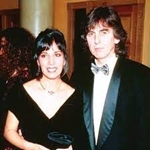
On Tuesday, George Harrison’s wife took to Instagram to mourn the loss of the Beatles legend, 21 years after he passed from lung cancer.
Harrison passed away in 2001 after a long battle with cancer.
In the 20+ years since the tragic loss of the legendary musician, there have been great advances when it comes to treating lung cancer — even advanced disease.
Newer treatments, like immunotherapy and targeted agents, can dramatically improve the length and quality of life for patients.
The wife of Beatles great George Harrison took to Instagram on Tuesday to mourn the loss of her husband, 21 years after the legendary rock star passed from lung cancer. Harrison was just 58 years old when he passed away in 2001. In the heartfelt post, Olivia Harrison shared a video of George while a live version of the
Source: Laura Gesualdi-Gilmore/survivornet.com
details
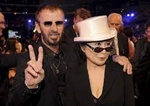
Yoko Ono received a famously chilly reception from The Beatles, but Ringo Starr said he always liked his bandmate’s wife. He was the only Beatle who flew to her side after John Lennon’s murder, and Lennon never felt the same anger toward Starr as George Harrison and Paul McCartney. Starr explained that he understood the connection between Lennon and Ono, which made him more receptive to her. He also shared what made him like Ono.Lennon and Ono met at an art gallery in 1966, when he was married to his first wife, Cynthia Lennon. They connected quickly, and Lennon soon split up with Cynthia and married Ono. The couple was famously close — Ono was a near-constant presence at Beatles recording sessions. This frustrated McCartney and Harrison, but Starr never had as much of a problem with her presence.
Source: Emma McKee/cheatsheet.com
details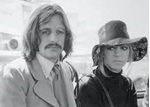
Ringo Starr established himself as a talented drummer early in his career. Then he changed drumming forever with The Beatles. He earned fame and fortune with the Fab Four, but one Beatles insider once explained how Ringo and his wife lived like simple people even after they purchased a huge estate.
Ringo moved from Liverpool to London once The Beatles made it big. England’s capital city was also the epicenter of the country’s music scene, so he vacated the working-class port town for cosmopolitan London.
The drummer shared a place with bandmate George Harrison. Then he moved to an apartment in Montagu Square, not far from Buckingham Palace. When Ringo and his wife, Maureen, were expecting their first child, they moved out of the apartment to a house near John Lennon’s residence in Weybridge outside of the city. (The two bandmates lived less than a mile apart). Yet the former Richard Starkey still held the lease, and the apartment became a playground for his famous friends.
Source: Jason Rossi/cheatsheet.com
details
The Monkees’ Davy Jones was present during the recording of The Beatles’ “Revolution 1.”
Peter Tork worked on George Harrison’s first solo album, Wonderwall Music.
A writer explained why members of the Prefab Four crossed paths with the Fab Four so much.
The Monkees‘ Davy Jones was there during the recording of The Beatles’ “Revolution 1.” During an interview, a writer explained why he was present for the recording. The writer revealed the Fab Four had many connections to the Prefab Four.
Andrew Sandoval is the author of The Monkees: The Day-by-Day Story of the 60s TV Pop Sensation. During a 2021 interview with Rolling Stone, he revealed The Monkees’ Mike Nesmith spent time at John Lennon’s home while Micky Dolenz spent time at Paul McCartney’s home. “The Beatles had no reason to invite these people into their homes other than they seemed to really like them,” Sandoval said.
Sandoval discussed other connections between the two bands. “That’s another interesting story,” he said. “Why did George Harrison get Peter Tork to play banjo on his first solo work, Wonderwall& details

John Lennon was the father of Julian Lennon — even if his fame with the Beatles impacted their relationship. Here’s what Cynthia Lennon said about John Lennon’s short trip to the hospital in her 2005 memoir.
In 1962, John and Cynthia Lennon got married after an unexpected pregnancy. In 1963, their first child, Julian Lennon, was born.
With Cynthia Lennon’s mother away in another country and John Lennon on tour with the Beatles, Cynthia Lennon was alone in the hospital when she gave birth to her son.
Busy with the Beatles, Lennon didn’t get a chance to visit his wife and son until 3 days after his birth. Cynthia Lennon described their reunion in her 2005 memoir, John. There were only complications because of John Lennon’s rising star power, which extended to the hospital.
“John arranged for me to be moved into a private room; he knew that both he and I might attract unwelcome attention if I stayed in the public ward,” Cynthia Lennon wrote. “It was wonderful to see him, but privacy was impossible.”
Source: Julia Dzurillay/cheatsheet.com
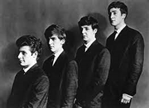
When The Beatles first formed, Pete Best served as the band’s drummer before being replaced by Ringo Starr. While all parties appeared to move forward amicably, John Lennon had some harsh feelings toward the drummer, which he shared years later.
Best first met The Beatles at the Casbah Coffee Club, which was opened by his mother. The Beatles played several concerts there in their early days and invited Best to join the band in 1960. In an interview shared by Express, John Lennon recalled asking Best to join The Beatles on a trip to Hamburg, Germany.
“We knew of this guy. He was living in his mother’s house that had a club in it, and he had a drum kit, so we dragged him, auditioned him, and he could keep one beat going for long enough, so we took him to Germany,” Lennon said.
Source: Ross Tanenbaum/cheatsheet.com
details
Celebrities have always struggled with their perceived public image, which is always on display to their fans and critics. This seems to be the case with Paul McCartney, a member of The Beatles who recently revealed how hard it was to live with his normal self against the stereotype he had already been labeled with.
Like all other band members, Paul also earned a nickname — in his case “the Cute Beatle” — from fans, which he usually disliked.
The songwriter claimed that the only time he did not resent his moniker was when he played himself in the 1964 movie, A Hard Day’s Night.“No, I didn’t mind it. No, no; I still don’t, I was in a film. I don’t care what they picture me as,” he told Rolling Stone. “So far as I’m concerned, I’m just doing a job in a film. If the film calls for me to be a cheerful chap, well, great; I’ll be a cheerful chap.”
Source: doyouremember.com
details
In 1967, The Beatles released their eighth studio album, Sgt. Pepper’s Lonely Hearts Club Band. “With a Little Help from My Friends” is the second track of the album and was written by Paul McCartney and John Lennon, with Ringo Starr on the lead vocals. The song has been covered many times, but arguably the most famous version was done by Joe Cocker.
In 1968, Joe Cocker completely reimagined the track, inspired by the blues and soul music. “With a Little Help from My Freinds” was the title track of his debut album, which peaked at No. 35 on the Billboard 200. Cocker received help from some of his friends for the track, which features guitar lines from Led Zeppelin guitarist Jimmy Page and organs from Tommy Eyre.
Source: Ross Tanenbaum/cheatsheet.com
details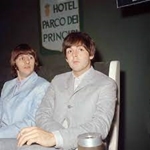
Before The Beatles publicly broke up, the band sent Ringo Starr as an emissary to talk to Paul McCartney. McCartney planned on releasing his solo album ahead of The Beatles’ album Let It Be. Angry, McCartney refused and threw Starr out of his house. Not long after, he publicly announced that the band had broken up. Starr said that up until this point, there had been a possibility that the band could have gotten back together.After years of increased tensions in The Beatles, John Lennon privately told his bandmates that he would be leaving the band in 1969. In 1970, McCartney made the news public. Lennon said that he first began thinking about leaving the band in 1966, when they stopped touring.
Source: Emma McKee/cheatsheet.com
details
From 1963 to 1970, these were the 12 UK studios albums released by The Beatles: Please Please Me, With the Beatles, A Hard Day’s Night, Beatles for Sale, Help!, Rubber Soul, Revolver, Sgt Pepper’s Lonely Hearts Club Band, The White Album, Yellow Submarine, Abbey Road and Let It Be. At various different points in their lives, the Fab Four revealed their individual personal favourites of the dozen. And here is what John Lennon, Paul McCartney, George Harrison and Ringo Starr said.
Source: George Simpson/express.co.uk
details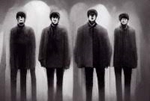
The Beatle's 12th and final studio album, Let It Be, was released in 1970. But Formidable magazine says there is actually a 13th studio album, or at least one can be compiled from post-Beatles songs that were written before the band broke up.
Beatles fans and music lovers in general, often fantasize about what the group might have produced had they stayed together and continued making music into the '70s. Well, the truth is, They did. There is the last Beatles album published during the 70s, we just need to look for it in the right places, because it´s out there, hidden in plain sight. So here is what we did. We look into Harrison, Lennon and McCartney recorded song demos for the Beatles rejected at the time, but ultimately released later on in their solo albums. If we keep in mind they had basically stopped collaborating on songs after 1967's Sgt. Pepper's Lonely Hearts Club Band, this material would have been the natural Beatles album to follow 1970 Let it Be. Magic occurs when you place and listen to these songs in the Beatles conceptual framework.
Source: Mark Frauenfelder/boingboing.net

"We did a lot of naughty, naughty things together" said Elton John about the Beatles legend. In a beautiful interview, Lennon's son later Sean told Elton his father "had a special love" for him.
On November 28, 1974, John Lennon made his last ever concert appearance, as a guest of Elton John at Madison Square Garden in New York. The two legends performed Whatever Gets You Thru the Night, Lucy In The Sky With Diamonds, and I Saw Her Standing There. It was the culmination of an intense relationship but also marked the moment Elton would lose what they had together. Five decades later, Elton opened up about that extraordinary two-year period with his fellow music idol to Lennon's son Sean.
Source: Stefan Kyriazis/express.co.uk
details
Each Beatles album has several standout songs. Not only do fans have their favorites, but The Beatles had their own standouts from what they created. There are many great songs from Abbey Road, but Paul McCartney believes the album’s biggest hit is his favorite.
While Let it Be was the final album released by The Beatles, Abbey Road was the final record the band recorded together. Tensions were building between the band as each member was on the verge of going their separate ways. However, they still managed to create a successful album with Abbey Road with several iconic songs.
Shortly after Abbey Road debuted, Paul McCartney had an interview with the BBC (shared by Far Out ), revealing his favorite song from the album, one that was written by John Lennon.
Source: Ross Tanenbaum/cheatsheet.com
details
Despite all of the tours Paul McCartney has done in his long career, he has never spent a Christmas on the road. He’s always managed to be with family every year. That’s a Christmas miracle.
In 2015, Paul answered fans’ Christmas-related questions on his website. One fan asked, “Have you celebrated any Christmas’ on the road?”
Paul revealed that he’s never spent Christmas on the road. He said, “No! I have always tried to be off. We always kind of specified that we wanted to be home.”
The only time Paul came close to being on the road on Christmas was during his time with The Beatles, before he had a family. “We used to have a Christmas show,” Paul said. “We used to get dressed up! And actually it was really cool because it was a sort of like a panto, but with musical people. A musically packaged show but with all sorts of little Christmassy things.
Source: Hannah Wigandt/cheatsheet.com
details